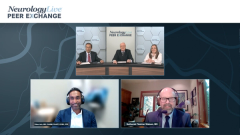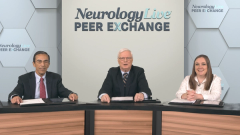
Managing Insomnia: Addressing Shortcomings in OTC Medications
Panelists review suboptimal over-the-counter medications that patients may use to manage insomnia.
Episodes in this series

Transcript:
Michael J. Thorpy, MD:Now, of course, many patients with insomnia are going to try to rely on over-the-counter [OTC] medications or take some substance to help them sleep. What about these substances and medications that you can buy in the pharmacy, are they useful for people? And what ones work, what ones don’t work?
Vikas Jain, MD, FAASM, FAAFP, CCSH, CPE: I guess that’s the million-dollar question so there are a variety of over-the-counter agents these days. It seems like there’s more and more going on the shelf because patients will come in saying, “Well, I’m using this. I’ve never heard of that one but let me add it to my list.” But there’s a lot of these agents that may provide a little bit of sedation. For example, antihistamines that you can take over the counter might make you a little drowsy. There’s melatonin available, L-tryptophan, valerian. The issue is so part of it is if you take something and you feel like it’s going to help you sleep and then you sleep better, then there may be some degree of placebo effect going on. The hard part is when you actually look at evidence-based reviews of many of these over-the-counter agents. They haven’t really been shown to provide consistent benefit in patients across the board and even in the guidelines that Nate had mentioned. They’re not generally recommended specifically for use in patients with insomnia itself. And then, the other over-the-counter medicine that’s not always mentioned is alcohol as well. There are a lot of patients that will sometimes drink wine, have a cocktail, and the issue with that is that while it may help them with their sleep latency, it generally fragments their sleep. And chronic use may lead to more chronic insomnia and more difficult to treat insomnia over time. Hence, it’s not a great practice.
Michael J. Thorpy, MD:Well, one of the most commonly used substances I think by people these days is melatonin, which really gets a lot of publicity. How useful is melatonin, really?
Nathaniel Fletcher Watson, MD: I don’t think it’s very useful, Michael. It’s useful to treat circadian rhythm sleep disorders certainly. There’s perhaps a little bit of evidence that it’s helpful for insomnia but I think, as Vikas said earlier, placebo effect is very real and pretty powerful. When you look at a lot of the clinical trials for medications for insomnia, the difference between the effect between nothing and placebo is oftentimes as big as the difference between placebo and active treatment, if not bigger. It really is true, and I think to me, though it’s fascinating because that tells you that the ability to sleep better is in your mind already. And you just have to tap into that, and you tap into this belief that you can sleep better and try to understand that, find that belief without need of believing that you have to take something. Thus, tapping into the placebo effect while knowing about it essentially.
Michael J. Thorpy, MD:Karl, some years ago, the NIH [National Institutes of Health] did a meta-analysis on melatonin, and they came to the conclusion that it didn’t have any benefit for insomnia. But it did, as Nate said, have an effect on the circadian rhythms. Are there any patients with insomnia that have difficulty falling asleep at night that actually could benefit from the use of melatonin as a phase-shifting agent?
Karl Doghramji, MD: It seems so. There are a couple categories of patients. One of the patients with delayed sleep phase syndrome, the youngsters who have this problem where they can’t fall asleep until the wee hours of the morning and then have difficulty waking up the next day. It’s typically something that occurs in adolescence. Melatonin administration earlier in the evening 2 or 3 or maybe even 4 hours before bedtime seemed to be helpful along with morning, bright, light therapy. The other category patients are the shift worker patients or jet lag sufferers, people who travel, there seems to be a circadian adjustment that melatonin can make, which is helpful. I might also say about the use of melatonin in indiscriminate insomnia patients. There have been a number of meta-analyses. The one you mentioned Michael was done by the NIH. There have been a few of them that have been published since that time. Some of them showing that it might have a modest effect of something like 6 minutes or 7 minutes improvement in sleep latency and total sleep time. Thus, the question, of course, always is with melatonin can you properly select the patient in whom it might help? Because it sounds as though if it may hurt some patients and not help others and this mixed bag is what we’re seeing, producing a mixed effect. Thus, possibly as you point out, selecting the patient of the circadian rhythm abnormalities may be better than just giving it any willy-nilly insomniac.
Transcript edited for clarity.
Newsletter
Keep your finger on the pulse of neurology—subscribe to NeurologyLive for expert interviews, new data, and breakthrough treatment updates.














